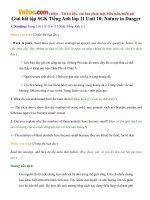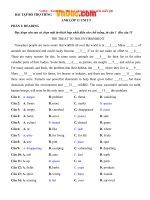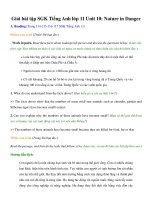bai tap tieng anh lop 11 unit 10 nature in danger co dap an
Bạn đang xem bản rút gọn của tài liệu. Xem và tải ngay bản đầy đủ của tài liệu tại đây (152.12 KB, 6 trang )
UNIT 10
I.
VnDoc - Tải tài liệu, văn bản pháp luật, biểu mẫu miễn phí
NATURE IN DANGER
Circle the word with the underlined letter(s) pronounced differently from that of the
others.
1. chemical
discharge
change
feature
2. nature
nation
suggestion
situation
3. scatter
panda
capture
devastate
4. danger
village
tiger
origin
5. supply
dirty
energy
happy
6. swallow
switch
sweet
sword
7. wild
prohibit
environment
survive,
8. danger
race
discharge
maintenance
9. supply
survive
industry
agriculture
10. scenic
extinct
decrease
coexist
II.
Complete these sentences with the correct form of the verb in the box.
endanger
scatter coexist
discharge
prohibit
survive
pollute devastate
protect capture
1. Many birds didn't survive the severe winter.
2. Animals shouldn't be captured for recreation arid entertainment.
3. The health of our children are being endangered by exhaust fumes.
4. The factory was fined for discharging chemicals into the river.
5. The explosion scattered a flock of birds roosting in the trees.
6. Laws have been introduced to prohibit killing endangered animals,
7. The air in the city is heavily polluted with traffic fumes.
8. The government should do more to protect the environment.
9. It is possible for local wildlife to coexist with industry.
10. Western India was devastated by a huge earthquake.
III.
Choose the word or phrase that best completes the sentences.
1. The panda's ______ habitat is the bamboo forest.
a. nature
b. natural c. naturalized
d. naturally
2. Learners can feel very ______ if an exercise is too difficult.
a. courageous
VnDoc - Tải tài liệu, văn bản pháp luật, biểu mẫu miễn phí
b. encouraging c. discouraged d. discouragingly
3. The ______ friendly products are designed not to harm the natural environment.
a. environment
b. environmental
c. environmentally
d. environmentalism
4. The waste from the chemical factory is extremely ______.
a. harm
b. harmful
c. unharmed
d. harmless
5. People are destroying the air by adding ______ to it.
a. pollutants
b. polluters
c. pollution
d. polluted
6. 14 per cent of primate species are highly ______.
a. danger
b. dangerous
c. endanger d. endangered
7. The ______ of old buildings should be taken into consideration.
a. preserve b. preservation
c. preservative
d. preserves
8. You have to be aware of the damage humans are doing to quicken the ______ of wildlife.
a. extinct
b. extinctive
c. extinctions
d. extinction
9. Animal ______ supporters gathered to protest' against hunting.
a. protect
b. protection
c. protective
d. protectionist
10. The main threat to the ______ of these creatures comes from their loss of habitat.
a. survive
IV.
b. survivor c. survival d. survivable
Join the sentence halves using which or whom after an appropriate preposition.
the furniture is to be delivered.
I had great respect.
most world trade was conducted.
she was divorced in 1995.
we went on holiday.
you should be aware.
I look up.
the printer was supplied.
it was named.
it was primarily written.
1. My English teacher, Mrs Brookes, was someone for whom I had great respect.
2. Until 1914 the pound sterling was the currency in/ with which most world trade was conducted.
3. They have changed the date on/ by which the furniture is to be delivered.
4. Pasteurisation was discovered by the French chemist Louis Pasteur, after whom it was named.
5. There are a number of safety procedures of which you should be aware.
6. Details are in the instruction manual with which the printer was supplied.
VnDoc - Tải tài liệu, văn bản pháp luật, biểu mẫu miễn phí
7. Ms. Peters was left the money by her former husband, from whom she was divorced in 1995.
8. She is one of the few people to whom I look up.
9. This is a photograph of our friends with whom we went on holiday.
10. The book is enjoyed by adults as well as children, for whom it was primarily written.
V.
How would you express the sentences you have written above in a less formal way, putting
the preposition at the end of the relative clause?
1. My English teacher, Mrs Brookes, was someone who/ that/ Ø I had great respect for.
2. Until 1914 the pound sterling was the currency which/that most world trade was conducted in.
3. They have changed the date which/ that/Ø the furniture is to be delivered on/ by.
4. Pasteurisation was discovered by the French chemist Louis Pasteur, who it was named after.
5. There are a number of safety procedures which/ that/ Ø you should be aware of.
6. Details are in the instruction manual which/ that/ Ø the printer was supplied with.
7. Ms Peters was left the money by her former husband, who she was divorced from in 1995.
8. She is one of the few people who I look up to.
9. This is a photograph of our friends who(m)/ that we went on holiday with.
10. The book is enjoyed by adults as well as children, who it was primarily written for.
VI.
Combine the, following pairs or groups of sentences by means of relative pronouns,
making any changes necessary.
1. Her many friends gave her encouragement. I like to be considered among them.
Her many friends, among whom I like to be considered, gave her encouragement.
2. Her father died last year. She looked after him for over twenty years.
Her father, who she looked after for over twenty years, died last year.
3. The bed has no mattress. I sleep on this bed.
The bed (which/that) I sleep on has no mattress./ The bed on which I sleep has no mattress
4. There wasn't any directory in the telephone box. I was phoning from this box.
There wasn't any directory in the telephone box, (which/that) I was phoning from.
5. I was sitting on a chair. It suddenly collapsed.
The chair (which/that) I was sitting on suddenly collapsed./ The chair on which I was sitting
suddenly collapsed.
6. Mr Smith said he was too busy to speak to me. I had come specially to see him.
VnDoc - Tải tài liệu, văn bản pháp luật, biểu mẫu miễn phí
Mr Smith, whom I had come specially to see, was too busy to speak to me.
7. I saw several houses. Most of them were quite unsuitable.
I saw several houses, most of which were quite unsuitable.
8. Graham took us to his office. It was filled with books.
The office (that/which) Graham took us to was filled with books.
9. Mr Marks is unhappy about the plans for the new dam. The stream flows across his farm.
Mr Marks, whose farm the stream flows across, is unhappy about the plans for the new dam./ Mr
Marks, across whose farm the stream flows,…
10. They picked up five boat-loads of refugees. Some of them had been at sea for several months.
They picked up five boat-loads of refugees, some of which had been at sea for several months.
11. Tom came to the party in patched jeans. This surprised the other guests. Most of the other guests
were wearing evening dress.
Tom came to the party in patched jeans, which surprised the other guests, most of whom were
wearing evening dress.
12. The people didn't know French. He was speaking to these people.
The people (who(m)/ that) he was speaking to didn't know French./ The people to whom he was
speaking didn't know French.
13. Mr Jones was very generous about overtime payments. I was working for him.
Mr Jones, who(m) I was working for, was very generous about overtime payments./ Mr Jones, for
whom I was working, was very generous ...
14. The Roman coins are now on display in the National Museum. A local farmer came across them in
a field.
The Roman coins, which a local farmer came across in a field, are now on display in the National
Museum.
15. Professor Johnson is to visit the University next week. I have long looked up to him
Professor Johnson, who(m) I have long looked up to, is to visit the University next week.! Professor
Johnson, to whom I have long looked up....
VII.
Suggest corrections or improvements to these sentences or write if they are already
correct.
1. The playground wasn't used by the children for who it was built. (whom)
VnDoc - Tải tài liệu, văn bản pháp luật, biểu mẫu miễn phí
2. The house into which the thieves broke is owned by Peter Brown. (which the thieves broke into)
3. The building from that Mr Marcus emerged was little more than a ruin. (which)
4. The party, to which I've been looking forward all week, is at Mary's house. (which I’ve been
looking forward to)
5. The water that she fell into was freezing cold.
6. The college is home to 30 students from Nepal, almost all of who are studying economics. (whom)
7. I have heard her on the violin and clarinet, both which she plays extremely well. (both of which)
8. It was the perfect tree under that to sit on a hot, sunny day. (which)
9. The film was made at Tulloch Castle, part of it dates back to 1466. (which)
10. A huge amount of oil was spilled, the effects of which are still being felt.
VIII. Complete each of the sentences with an appropriate preposition.
1. A number of rare animals are now in danger of extinction.
2. If people's interference in the environment decreases, more species will survive and produce offspring.
3. The government should do more to protect rare animals from being extinct.
4. She believes there is life on other planets.
5. The EU has imposed a ban on the import of seal skins.
6. People are destroying the air by adding pollutants to it.
7. Human beings are responsible for the changes in the environment.
8. They are changing weather conditions by cutting down trees in the forests.
9. National parks should be set up to save animals and plants.
10. Raw sewage was discharged from the treatment plant directly into the river.
IX.
Write a passage about the tropical rainforest, using the cues given.
The tropical rainforests/ a delight/ people/ love nature. The forests/ beautiful woodlands/ receive/
plenty of rain.
Nowadays/ tropical rainforests/ danger/ extinction. Each year/ millions of acres/ rainforests/ clear/
make way/ population growth/ agriculture. This/ result/ the destruction/ millions of plants. This
destruction/ cause/ some types of animals/ lose/ their natural habitat. Because/ this/ many species/
plants/ animals/ become/ extinct.
VnDoc - Tải tài liệu, văn bản pháp luật, biểu mẫu miễn phí
It/ important/ us/ save/ the tropical rainforests. Once/ tropical rainforest/ destroy/ it/ take/ hundreds
of years/ before/ the forest/ re-establish.
The tropical rainforests are a delight to people who love nature. The forests are beautiful
woodlands which receive plenty of rain.
Nowadays, tropical rainforests are in danger of extinction. Each year millions of acres of
rainforests are cleared to make way for population growth and agriculture. This results in the
destruction of millions of plants. In turn, this destruction causes some types of animals to lose their
natural habitat. Because of this, many species of plants and animals are becoming extinct.
It is important for us to save the tropical rainforests. Once a tropical rainforest is destroyed, it
will take hundreds of years before the forest can be re-established









